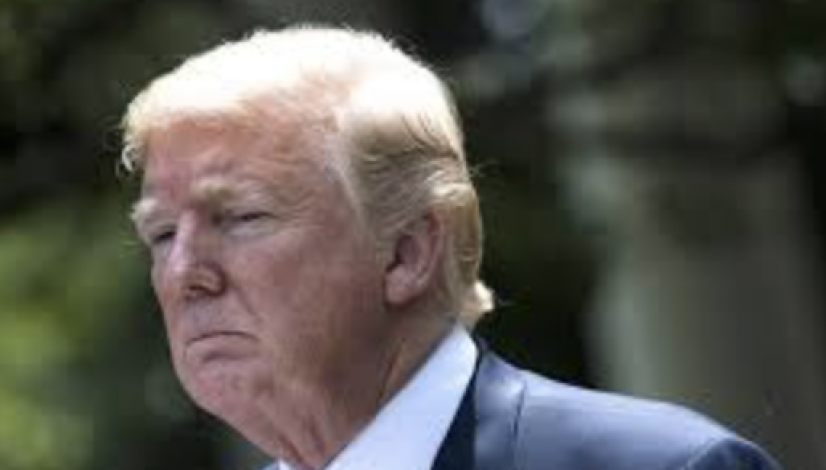Trump putting booming economy, own popularity in jeopardy

President Trump’s approval ratings are climbing. That may not be a good thing.
For the first time, according to the CNBC All-America Economic Survey, more than half the country approves of President Trump’s handling of the economy.
At the same time, 54 percent of Americans say the economy is “good” or “excellent” — the highest recorded in the poll’s 10-year history. For the first time, the number of people describing the economy as excellent tops those saying it is poor.
As a result, the president’s overall popularity is increasing, to the best level since he entered the Oval Office. The bad news? A plurality of 45 percent approve of the tariffs Trump has slapped on imports such as aluminum and steel; only 38 percent disapprove.
That is worrisome because the president will be emboldened by these soundings, and will likely continue to press a trade battle that is beginning to have real consequences for the economy.
Harley-Davidson made headlines recently when it suggested that in response to increased tariffs on its motorcycles imposed by the EU it might have to move some production out of the U.S. It is one of the first indications that Trump’s trade spat could hurt, not help, American workers; but it isn’t the only one.
European carmakers are hinting that if Trump follows through on threats to raise tariffs on imported cars, they may re-evaluate their sizable commitment to manufacturing in the U.S.
Daimler AG, parent of Mercedes-Benz, stated that retaliatory chargeson its exports to China from its Alabama plant are hurting its bottom line. Wisconsin cheesemakers face stiff import duties now shipping into Mexico.
Evidence is mounting that Trump’s trade battles with friends and foes alike could soon dampen the extraordinary optimism that the president has inspired through lowering taxes and rolling back regulations.
Wall Street’s top economics team at ISI Evercore issued a cautionary note to clients within the past few days, recounting numerous tales of “trade pain” — anecdotal evidence that rising uncertainty about the disputes is causing business managers to suspend expansion plans and delay investments.
In short, President Trump is playing with fire. With his aggressive efforts to level the playing field for American exports, he risks tapping the brakes on an accelerating economy and sideswiping his own improving approval ratings.
As we head toward the midterm elections, it is inconceivable that he and his advisors will allow the trade battle to spiral out of control, but recent headlines have suggested it could happen. That would be a self-inflicted wound of enormous proportions.
Investors are signaling impatience with the president’s combative trade posture. While the underlying momentum of the economy remains on track, rising anxiety about the impact of the trade disputes has led to increased volatility and a market downdraft.
The Dow Jones Industrial Index is off only about 2 percent from the start of the year, but it is down 8 percent from the high reached a few months ago. That drop is in spite of gangbuster earnings gains of roughly 25 percent projected for the second quarter and real GDP growth of better than 3 percent.
Investors should be applauding those prospects, not wringing their hands over potential damage from trade battles.
While the president’s aggressive push-back against unfair trade policies from the EU and China are long overdue and cheered by supporters, it is alarming that no one has blinked.
Early in the spat with China, Beijing officials appeared willing to grant some relief from tariffs and be somewhat amenable to changing policies to allow American companies greater access. The markets greeted such overtures enthusiastically.
But the Trump White House was not willing to take “yes” for an answer, and the threats, as well as the goods targeted by tariffs, expanded.
China then balked, with President Xi Jinping seemingly deciding that in his country, where saving face is a national pastime, he could not afford to be seen giving in to the pugilistic American president.
In a recent meeting with multinational CEOs, Xi commented that in China it is not the custom to turn the other cheek but rather to “punch back.” This was an alarming message, and investors treated it as such.
Still, there are signs that the dust-up is hurting China’s economy and rattling policymakers. Just recently, Beijing loosened the reserve requirements on Chinese banks, freeing up about $100 billion in capital to spur lending as the economy slows.
This move came in spite of officials’ efforts to reduce the country’s overall debt burden, which now towers at over 2.5 times China’s GDP. A turnabout in the deleveraging push suggests that the administration is worried its 6.5-percent growth target may not be met.
President Trump has taken a cleaver to international trade agreements and norms and correctly so. He is right to challenge the unfair practices that have put American exporters at a disadvantage in dealing with the EU and China and that have helped create a monster trade deficit.
But unless he is able to show progress in the next few months, support for his tariffs and his aggressive trade policy will start to fade. He needs to enlist corporate America’s help in resetting trade relations.
He should also settle for some gains in our trade deals with the EU and bring that block on board to jointly fight China’s widespread cheating and intellectual property theft.
Trump needs a win on trade; he most certainly does not want to tank the economy, with the midterms only months away. A Democrat takeover of the House would undo much of what the president has accomplished and thrust us back into the dreary Obama years.
Some tempering of his trade agenda is a reasonable price to pay for a booming economy and political stability.
Published on The Hill




